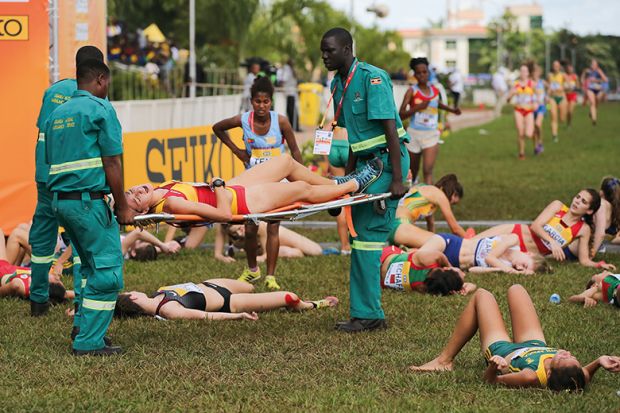It was only when Rebecca Pope-Ruark began talking about the issue of faculty burnout that she discovered that the colleagues she shared an office with had been secretly worried about her for a long time.
“They knew I was stressed; I was always doing too much, but they didn’t have that conversation with me. They never told me they were worried,” she said.
“Part of it was I wouldn’t have listened when I was in that state; I would have said, ‘I’m fine and need to get back to work.’ But I think we need to be shifting the mindset to have these conversations and encourage people to be open with each other.”
It was in 2018, when Dr Pope-Ruark was working as an associate professor of English at Elon University in North Carolina, that she finally admitted something she had known deep down for a while: her working life had become unbearable.
Seeking help for what she thought was depression and attention deficit disorder, a therapist gave her a different diagnosis, of burnout.
“I was at a place in my professional life where I couldn’t focus on anything, I couldn’t think straight. I was miserable, I didn’t want to be on campus,” she said.
“I would go and do my duties and try to leave as soon as possible and avoid any interaction with my colleagues and students. This was very much not like me. It was developing for a good year or two before we put a label on it.”
While there is increasing recognition of the problem of burnout in academia – “just about everyone either has their own story or knows someone who has gone through something like this”, Dr Pope-Ruark said – support is still lacking across the sector.
Dr Pope-Ruark has turned her experiences into a book – Unraveling Faculty Burnout: Pathways to Reckoning and Renewal – which charts her own recovery and that of female colleagues in an attempt to inspire others to find ways back from burnout and encourage the sector to make changes so that others do not have to go through similar experiences in future.
Many industries are prone to burnout, but academia has a unique mix of factors that converge to amplify the problem, according to Dr Pope-Ruark.
Whether it is trying to be the perfect teacher, promote important research findings, bring in funding for new projects or care for students, the pressures combine to form a never-ending to-do list in a culture in which scholars are constantly expected to do more with less.
Dr Pope-Ruark said she, like many others, was “a go-getter”: “I had an edited collection in the works and a journal special issue. I was doing my usual teaching load – and we were very student-focused – and I was developing an education programme that would have changed the way students took courses.
“It became overwhelming and resulted in such stress that it exacerbated any mental health issues I was dealing with.”
Only when medics told her to step back did she do so, and her institution agreed for her to take a semester on medical leave to prioritise her recovery.
Still, fears about letting people down made it hard to speak to colleagues. “In the early days, there was absolutely some shame associated with it – a feeling of, ‘What’s wrong with me? I can’t hack it any more. Why is it happening?’” she said.
Eventually Dr Pope-Ruark decided she had to leave and start something new in order to move on. She is now director of the Office of Faculty Professional Development at the Georgia Institute of Technology.
But, she said, resigning is not always the answer, and her book features many examples of academics who were able to return to their previous roles having found new ways to cope.
Part memoir, part academic research and part self-help guide, the book was not intended to give advice, said Dr Pope-Ruark. Some who share their burnout stories are prone to an unhelpful attitude of “Hey look, I overcame it, I’m better, I’m working”, she said, which serves to keep the focus on productivity and can become toxic.
Instead, she said, she wants to demystify burnout, not to “catch and fix it”, so that academics are much more aware that it could be something they face given their career choice, and of how to access support for themselves or colleagues if necessary.
“The biggest takeaway [for readers] is you are not alone because you are experiencing these things. And you are not mentally ill because, although burnout can exacerbate things like depression and anxiety, it is classified as a syndrome.
“There’s nothing to be ashamed of because it’s a cultural problem that we all need to come together to address.”
Register to continue
Why register?
- Registration is free and only takes a moment
- Once registered, you can read 3 articles a month
- Sign up for our newsletter
Subscribe
Or subscribe for unlimited access to:
- Unlimited access to news, views, insights & reviews
- Digital editions
- Digital access to THE’s university and college rankings analysis
Already registered or a current subscriber? Login








